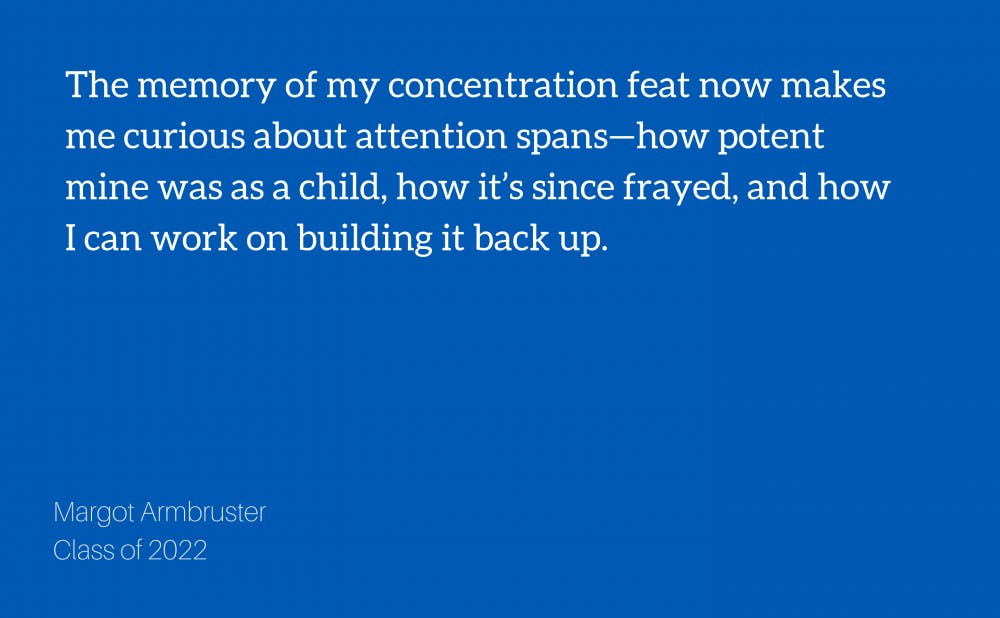I remember release night for “Harry Potter and the Deathly Hallows” like people remember family births and weddings. I was seven and a superfan, so my dad woke me up at midnight to stand in a line which stretched three blocks through our sleepy Dutch city. When we reached it, the bookstore was filled with synthetic fog and plastic decorations, and a Hogwarts-robed cashier even comped my copy because we were tenth in line. We made a twelve-hour drive to vacation in Provence the following day, and I’d finished the book before we parked the car.
At the time, I was most excited about the free book and chance to be outside after bedtime, but in retrospect, it’s the voracity of my reading that I marvel at. I’m more easily carsick now, but even stationed in an armchair, I don’t think I could knock back those 700-odd pages in one go. Indeed, I’ve recently found that reading for long stretches, whether the material’s academic prose or fiction, requires that I struggle constantly against distraction and the waning of my mental energies. The memory of my concentration feat now makes me curious about attention spans—how potent mine was as a child, how it’s since frayed, and how I can work on building it back up.
The distractions are obvious. Like almost everyone I know, I’m constantly scrutinizing my relationship to my phone, laptop, and other instruments of procrastination. In various bids to reduce addiction, I fiddle around with notification settings, delete apps from my phone, or switch displays to grayscale. But Cal Newport, a computer scientist, social-media skeptic, and professor who churns out New York Times bestsellers on tech and student life, would dismiss these steps as coping mechanisms missing the fundamental problem: my failure to adopt a strict “digital minimalism” and systematically evaluate whether the technologies in my life add value, then eliminate those which don’t pass the test.
In an ideal world, we’d all fulfill Newport’s regimen. For reasons including peer pressure and my self-destructive love of Twitter, my own progress on his path has remained slow, but history tells us that distraction, and attempts to combat it, are fundamental to the human psyche—the battle for our attention spans predated, and will certainly outlast, the technologies we presently enjoy.
The writings of medieval monks, for instance, reveal that they had to fight bitterly to inhabit the mens intentus (Latin for “mind fixed on its object”) and maintain devotion to sacred texts, rituals, and hymns. Centuries before the smartphone, their minds wandered out the window into daydreams and anxieties, prompting various coping strategies: scholars avoided family, gossip, and other distractions through monastic seclusion; devised vivid mental animations as mnemonics for important concepts; and engaged in regular, mind-clearing manual labor. It’s by turns frustrating and comforting to learn that this struggle is so universal.
Newport, always preoccupied with maximizing human productivity, has brought his talents to bear on these broader questions of creativity and concentration. His 2016 bestseller Deep Work, whose title refers to focus on a complex intellectual task, unpacks the requirements for intellectual achievement without the pain and procrastination. I find particularly helpful its suggestions that we zealously protect our “deep work” time by scheduling it in advance, block messaging and email during deep work periods, and hold ourselves accountable by regularly logging our progress. Attention, he writes, is a muscle (literally – just as accumulated myelin sheaths enable us to perform physical movements, so too do they protect our brain’s generative processes) which, with careful training, can grow stronger.
I rarely meet his standards, but I find Newport’s work an invaluable benchmark. Central as attention is to our role as students, though, I think it has even richer dividends to pay in our relationships.
The 20th-century French philosopher Simone Weil wrote that “attention is the rarest and purest form of generosity” and added elsewhere that “taken to its highest degree, it is the same thing as prayer. It presupposes faith and love.” I can grant my own fundamentally limited faith and love to a poem, an equation, or a children’s novel about a boy wizard, but I can also give it to a parent, a sibling, a friend in crisis. Here, too, does my distractible brain betray me; here, even more, do I need to cultivate my focus and presence.
My goal for this semester—the gift I’m giving myself—is the chance to luxuriate in both my academics and my friendships without distraction or emotional absence. It’s a slow road, full of traps and doubling back on itself, but it’s one, I think, worth traveling.
Margot Armbruster is a Trinity sophomore. Her column runs on alternate Mondays.
Get The Chronicle straight to your inbox
Signup for our weekly newsletter. Cancel at any time.

Margot Armbruster is a Trinity senior and opinion editor of The Chronicle's 117th volume.

